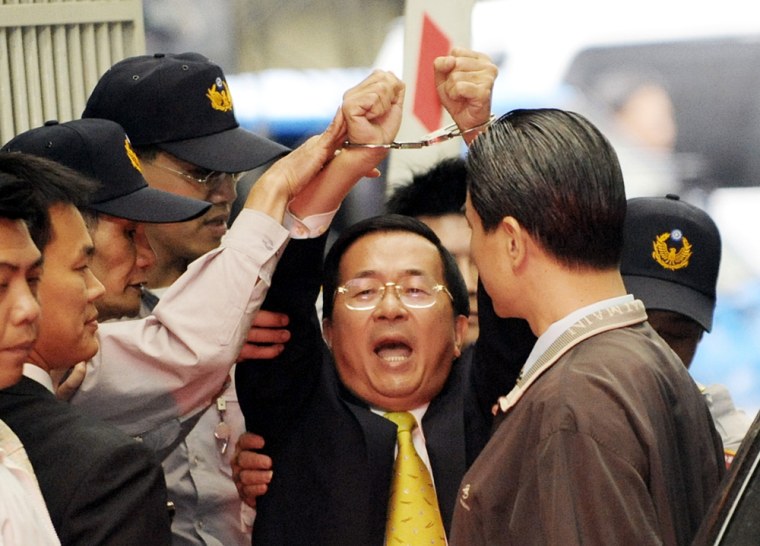The downfall of the former Taiwanese president, captured in striking images of the ex-leader being led away to jail, has called into question whether his pro-independence movement has been sidelined as a vibrant political force.
As Taiwan's leader from 2000 to May 2008, Chen Shui-bian made formal independence from China a sacred cause — doing everything he could to emphasize its political and cultural separateness from China, from which it split amid civil war in 1949.
The question now is whether Chen's detention Wednesday on corruption charges is a sufficiently serious blow to render the pro-independence movement a spent force — or whether it can yet recover from its leader's fall from grace.
A Taipei court ordered Chen held under a type of pre-indictment detention after prosecutors accused him of laundering money and illegally tapping a special fund during his presidency. His detention started dramatically Tuesday when he was led away in handcuffs from a prosecutors' office, taken to court, then sent to jail in early Wednesday.
Fall from grace
The nearly 21 hours of legal proceedings were interrupted briefly when Chen was taken to the hospital after complaining he had been injured while being transported from the prosecutors' office to the nearby court building.
Chen has denied any wrongdoing. But the detention marks a further downfall for a landmark figure in Taiwanese politics and a pro-independence advocate.
Already put off by widespread reports of Chen's corruption and China's threats to attack if his pro-independence line were ever implemented, Taiwanese voters pummeled his Democratic Progressive Party in two votes earlier this year. They elected rival Ma Ying-jeou president, and propelled Ma's Nationalist Party to a dominating victory in the legislature.
A key to the Nationalist victories was Ma's promise to harness Taiwan's laggard economy to China's growth juggernaut. Rejecting Chen's policy of keeping China at arms length, Ma said that Taiwan should open regular direct air and sea links with the mainland — they were broken in 1949 — and reduce existing trade and investment barriers between the sides.
Since his inauguration six months ago, Ma has worked hard to carry his promises out. Investment restrictions were the first to go, and just last week, during a historic visit to Taipei by senior Chinese envoy Chen Yunlin, pacts were signed to triple the volume of flights across the 100-mile wide Taiwan Strait and sanction the first direct shipping links in almost 60 years.
Anti-China sentiment
But as Chen Yunlin himself learned during his trip, a substantial residue of anti-Chinese sentiment — and pro-independence activism — still remains in many areas of Taiwan. Hundreds of demonstrators dogged him throughout Taipei, and thousands marched in the city's streets to protest his efforts to bring Taiwan and China closer together economically.
Beijing insists Taiwan is part of Chinese territory and has threatened war if the island of 23 million people moves to make its 59-year break with the mainland permanent.
Political scientist Chu Chao-hsiang of Taiwan's National Taiwan Normal University said that Chen's arrest will have a negative impact on the independence movement in the short term, but that the damage will not endure.
Searching for a new leader
"Activists will feel frustrated ... because Chen's arrest is a major moral flaw for the movement," Chu said. "But in the long term, people will be able to separate the movement from Chen, and there will be a new leader to replace him."
Still, Chu said, if China can succeed in demonstrating the benefits of closer economic cooperation to ordinary Taiwanese, any independence leader could have difficulty gathering support.
"If Taiwan can benefit from working closely with China when it is rising ... then it will be bad for the independence movement," he said.
'Failed badly'
Chu's analysis was supported by 32-year-old Hsiao Chueh-min, a sales representative for a Taipei trading company, who said economic well-being was much more important to him than steering clear of China.
He said the independence movement had its chance during Chen's presidency — particularly in its efforts to gain greater international legitimacy for Taiwan — but now the moment was past.
"The independence activists tried very hard to improve Taiwan's international standing while sacrificing the opportunity to improve Taiwan's economy, and they failed badly," he said. "So now we should try an alternative and focus on Taiwan's economy."
